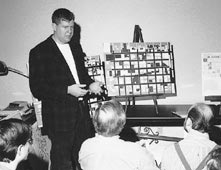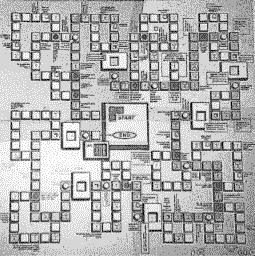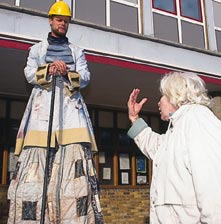Community Planning: Methods
Gaming
- description
- more detail
- more pictures
Games are a good way to help people understand the planning process and other people's viewpoints. They are also an enjoyable way to get people working together. They are particularly useful at an early stage of any community planning activity or to prepare people for a specific challenge ahead.
Games are devised to mirror real life planning scenarios or to teach specific skills.
Games are devised to mirror real life planning scenarios or to teach specific skills.
The games are mostly played in groups, usually helped by a facilitator or someone who has played them before. Many games involve role play; people acting as if they were someone else.
There is usually no specific output other than increased awareness but they may produce preliminary design proposals or an agenda for future initiatives needed.
Photocredits
top: Ball State University, Indiana, USA, 1995 Tony Costello
top: Ball State University, Indiana, USA, 1995 Tony Costello

Acting someone else's role
Local resident pretending to be a public official speaking at a planning hearing. Exercise designed to help residents deal better with a forthcoming hearing about their area.

Board game
One way of discovering about the housing development process. The game uses hurdles, gates and tradeoffs which players negotiate as they proceed through the planning process. Designed to be played at the start of a planning workshop to inform and "break the ice" between participants (see the book Action Planning for Cities for details.)
Tips
- When role playing, wearing badges with the name or title of the person being imitated and even suitable hats can help people feel at ease.
- Make people play someone with a very different role to themselves. For example, a planner could play being a poor child; a female tenant could play a male housing officer.
- Sometimes it can be interesting to have the person playing a role being advised by the real thing; ie the resident playing at being a planner being advised by a real planner.
- Games are good energisers and help overcome shyness.
Costs
- Main costs in use: Facilitator's fees. Developing and producing some games can be expensive in time and artwork.
Urban design role play game format
Format for a role play game allowing people to explore planning issues that may arise in the coming years.
Format for a role play game allowing people to explore planning issues that may arise in the coming years.
- Pick an issue
Facilitator introduces game and helps people to agree on an issue or site as the focus of the game (eg local transport improvements). (10 mins) - List interests
All the parties with an interest in, or affected by, the issue are listed on a flipchart (eg pedestrians, bus drivers, transport planners, cyclists, etc). (5 mins) - Give out roles
Everyone is given a role which is written on their name badge. (5 mins) - List desires and concerns
People think about what someone in the role they have been given would want. (10 mins) - Presentation
Everyone in turn presents their points to the whole group with visual explanation if possible. (20 mins) - Dealing
People mingle freely and attempt to make deals with each other. (30 mins) - Report back
Everyone reports back to the whole group on what they have achieved. (15 mins) - Next steps
General debate on how to take things forward. (15 mins)
Running time: 100 mins
Ideal numbers: 10-20 per workshop
Game types
- Board games
Adaptations of popular board games to simulate planning and design scenarios. - Picture analysis
Getting people to say what they see in a picture and comparing notes. - Role play
Acting out being in someone else's shoes. - Storytelling
Reciting real or imaginary tales as a way of exploring hidden perceptions. - Theatre
Performing plays to characterise real life and stimulate debate.

Theatre
Powerful architect on stilts confronts a determined tenant in a performance on a housing estate designed to engage residents in conversation about their environment.
Photocredits
Tower Hamlets, London, UK, 1999,
Architects Foundation
Tower Hamlets, London, UK, 1999,
Architects Foundation
Thanks: Urban design game format devised by Drew Mackie